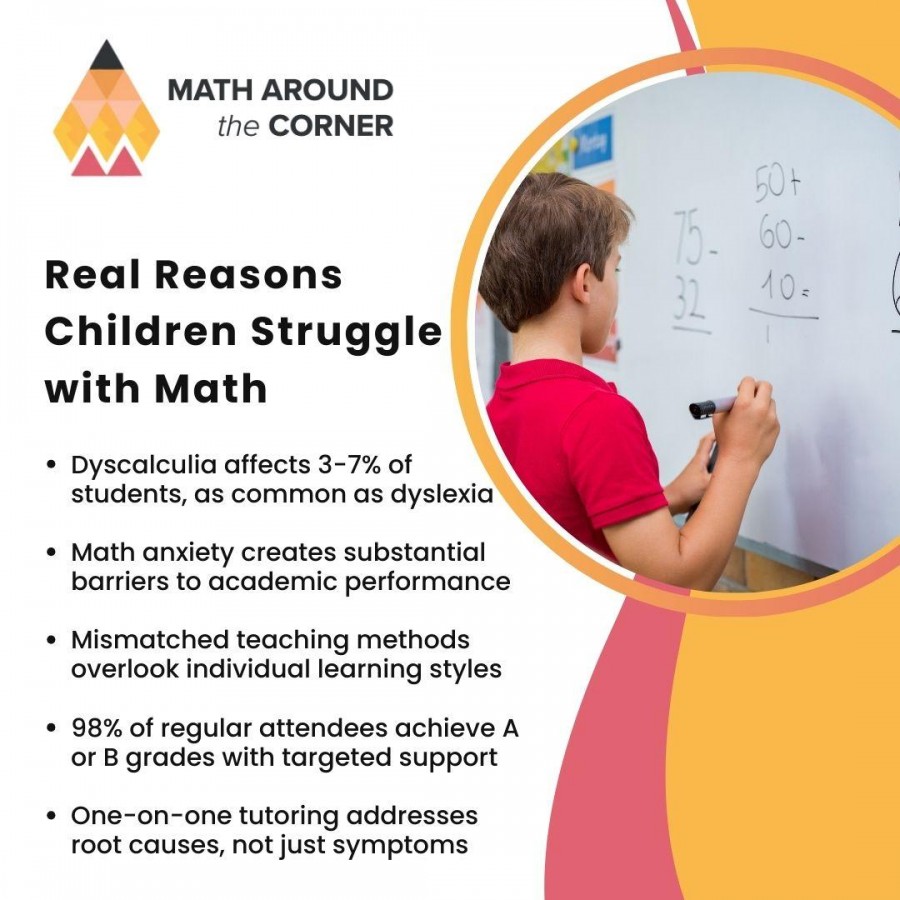The Real Reason Your Child Struggles with Math (It's Not What You Think)

Your child's math struggles aren't about intelligence or effort. The real culprits are often invisible learning differences, anxiety, and teaching methods that don't match how their brains process numbers.
Parents across Fort Worth and the Dallas-Fort Worth metroplex often assume their child just isn't "a math person" when grades start slipping. But research shows math struggles go beyond natural ability. With guidance from math tutors nearby at Math Around the Corner, students can uncover their true potential.
Key Takeaways
- Math struggles often stem from hidden learning differences, not a lack of intelligence. Dyscalculia affects 3-7% of children. It creates specific barriers to mathematical thinking that require specialized support from qualified math tutors near you.
- Math anxiety creates a destructive cycle that significantly impacts performance. Research shows that math anxiety is linked to lower achievement, making it important to address emotional barriers alongside academic skills through personalized math tutoring approaches.
- Foundation gaps in number sense create compound learning problems. Students missing early mathematical concepts struggle with advanced topics, which is why effective math tutoring tips focus on identifying and filling these foundational holes before moving forward.
- One-on-one instruction addresses root causes that classroom teaching often misses. An online math tutor or in-person specialist can adapt methods to match individual learning styles, processing speeds, and specific needs that generic instruction cannot accommodate.
Professional assessment reveals specific intervention needs for lasting success. Rather than assuming your child "isn't a math person," seek help from experienced math tutors near you who can diagnose underlying issues and provide targeted solutions that build both skills and confidence.

The Hidden Learning Difference Affecting 3-7% of Students
Dyscalculia affects between 3-7% of school-aged children, making it as common as dyslexia. Yet most parents have never heard of this math-specific learning disability that impacts how the brain processes numbers and mathematical concepts.
Children with dyscalculia don't simply struggle with arithmetic. They have difficulty connecting numbers to quantities, understanding basic math symbols, and grasping concepts like "greater than" or "less than." Unlike general academic challenges, dyscalculia creates specific barriers to mathematical thinking that persist without proper support.
Dr. Carol Bearden, founder of Math Around the Corner in Fort Worth, has observed that many students who excel in reading and writing struggle with math because their brains process mathematical information differently, not because of a lack of intelligence.
Math Anxiety: The Silent Achievement Killer
Math anxiety negatively correlates with performance, with studies showing a correlation between anxiety and math achievement. This means higher anxiety consistently predicts lower math performance across different populations.
Math anxiety creates a vicious cycle. Students experience stress about math, which impairs their working memory and problem-solving abilities during tests and assignments. Poor performance then reinforces their anxiety, making future math encounters even more stressful.
The anxiety often begins early. Research shows that even kindergarten students with general anxiety demonstrate lower math achievement, with girls particularly affected by anxious feelings around mathematical tasks.
How Teachers Unknowingly Transfer Math Anxiety
Female elementary teachers with high math anxiety can inadvertently transfer these feelings to their female students. When teachers exhibit negative attitudes toward math or express their own fears about mathematical concepts, students absorb these messages and begin to internalize similar beliefs about their abilities.
Teaching Methods That Miss the Mark
Traditional math instruction often relies on memorization without building conceptual understanding. Students learn procedures like long division or fraction operations without grasping the underlying mathematical principles.
Many children need multiple exposures and different explanation methods before concepts click. A one-size-fits-all classroom approach can leave students behind, creating knowledge gaps that compound over time.
Math tutors near you should recognize these individual learning differences. Effective math tutoring adapts to each student's processing style, whether they need visual representations, hands-on manipulatives, or verbal explanations to understand mathematical concepts.
The Foundation Problem: Missing Number Sense
Students struggling with advanced math often lack solid foundational skills. Number sense - the intuitive understanding of numbers, their relationships, and operations - serves as the bedrock for all mathematical learning.
Children who missed early number sense development may memorize multiplication tables without understanding that multiplication represents repeated addition. They solve problems mechanically without recognizing patterns or relationships between mathematical concepts.
Grade Level | Common Foundation Gaps | Impact on Future Learning |
K–2 | Counting, number recognition, basic addition/subtraction | Difficulty with place value and mental math |
3–5 | Multiplication facts, fractions, place value | Struggles with algebra and advanced problem-solving |
6–8 | Proportional reasoning, negative numbers, basic algebra | Limited success in high school mathematics |
9–12 | Algebraic thinking, function concepts | Challenges in calculus and advanced mathematics |
Working Memory and Processing Speed Challenges
Some students struggle with math because their working memory, the ability to hold and manipulate information mentally, becomes overwhelmed by complex mathematical processes. These students may understand individual steps but lose track when problems require multiple operations.
Processing speed differences also affect math performance. Students who need extra time to work through problems may appear to struggle with concepts they actually understand. Time pressure during tests and assignments can mask their true mathematical abilities.
The Role of Learning Environment and Support
Parents and teachers play a role in either supporting or hindering mathematical development. Children whose parents express math anxiety or make statements like "I was never good at math either" receive subtle messages that mathematical ability is fixed rather than developable.
Conversely, students who receive encouragement, have mistakes normalized as part of learning, and experience math as problem-solving rather than memorization develop stronger mathematical identities and persist through challenges.
Why One-on-One Support Makes the Difference
An online math tutor or in-person math tutor can identify and address these underlying issues. Individual attention allows tutors to:
Assess foundational gaps that group instruction misses
Adapt explanation methods to match learning styles
Build confidence through appropriate challenge levels
Address anxiety through supportive, non-judgmental environments
Teach coping strategies for mathematical stress
Math Around the Corner's approach focuses on understanding each student's specific needs rather than applying generic tutoring methods. This personalized attention helps students develop both skills and confidence.
Math Tutoring Tips for Parents
These math tutoring tips can support your child's mathematical development:
Focus on understanding over speed - Allow your child time to work through problems conceptually rather than rushing to find answers.
Use real-world connections - Help your child see math in cooking, shopping, sports, and daily activities to build number sense.
Normalize mistakes - Frame errors as learning opportunities rather than failures to reduce math anxiety.
Ask "how" and "why" questions - Encourage your child to explain their thinking process rather than just providing answers.
Celebrate progress - Acknowledge improvement in understanding, not just correct answers.
Provide consistent support - Regular, brief math practice sessions work better than occasional long sessions.
Identifying When Professional Help is Needed
Watch for these signs that your child may benefit from specialized math support:
Consistently avoiding math homework or expressing strong negative emotions about math
Difficulty with basic number concepts appropriate for their age
Strong performance in other subjects, but persistent math struggles
Physical symptoms like headaches or stomach aches before math tests
Inability to estimate reasonable answers or recognize when solutions don't make sense
Math tutors near you can provide assessments to identify specific areas of difficulty and develop targeted intervention plans.

Building Mathematical Confidence Through Understanding
Success in math requires more than learning procedures - it demands developing mathematical thinking skills. Students need opportunities to explore patterns, make connections between concepts, and understand the logic behind mathematical operations.
When children understand the "why" behind mathematical procedures, they can apply knowledge to new situations rather than relying on memorization. This conceptual understanding builds the flexibility needed for advanced mathematical thinking.
The Path Forward: Hope and Practical Solutions
Your child's math struggles are not permanent. With appropriate support, students can overcome mathematical difficulties and develop strong numerical skills. The key lies in identifying the root causes rather than treating surface-level symptoms.
Whether the issue is a learning difference like dyscalculia, math anxiety, missing foundational skills, or teaching methods that don't match learning style, targeted interventions can make a significant difference.
Professional math tutoring provides the individualized assessment and support that many students need to unlock their mathematical potential. When students receive instruction that matches their learning needs, they often discover abilities they never knew they possessed.
Taking Action for Your Child's Mathematical Future
If your child continues struggling with math despite effort and traditional help, consider seeking specialized support. An online math tutor or local math tutors near you can provide the assessment and suggest any intervention needed to address underlying issues.
Math Around the Corner has helped hundreds of students in the Fort Worth area overcome mathematical challenges and develop confidence in their abilities. Our individualized approach addresses each student's specific needs rather than applying one-size-fits-all solutions.
Mathematical success is within reach for every child. The first step is understanding that struggles often stem from identifiable, addressable causes rather than innate limitations. With proper support, your child can develop both the skills and confidence needed for mathematical success.
Ready to discover what's really behind your child's math struggles? Contact Math Around the Corner at (817) 720-6284 or email hello@matharoundthecorner.com to schedule a consultation. We serve Fort Worth, Dallas, and the entire DFW metroplex with both in-person and virtual tutoring options.
